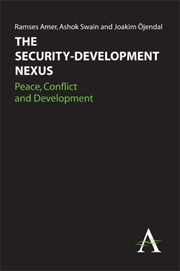Book contents
- Frontmatter
- Contents
- List of Tables and Figures
- List of Editors and Contributors
- Acknowledgements
- Chapter 1 Researching the Security-Development Nexus through a Multi-disciplinary Approach
- Chapter 2 Exploring the Security-Development Nexus
- Chapter 3 Liberal State-Building and Environmental Security: The International Community between Trade-Off and Carelessness
- Chapter 4 The Rising China and Maintaining the International Order: Some Reflections
- Chapter 5 Non-use of Force, Non-interference and Security: The Case of Pacific Asia
- Chapter 6 International Dimensions of Peace Processes in Aceh and Sri Lanka: The Role of Intermediaries in the 2000s
- Chapter 7 The Challenges of Human Security and Development in Central Asia
- Chapter 8 Diasporas' Role in Peacebuilding: The Case of the Vietnamese-Swedish Diaspora
- Chapter 9 Tracing Minerals, Creating Peace: The Security-Development Nexus in the DRC
- Chapter 10 Water Management and the Security-Development Nexus: The Governing of Life in eThekwini Municipality, South Africa
Chapter 9 - Tracing Minerals, Creating Peace: The Security-Development Nexus in the DRC
Published online by Cambridge University Press: 05 June 2012
- Frontmatter
- Contents
- List of Tables and Figures
- List of Editors and Contributors
- Acknowledgements
- Chapter 1 Researching the Security-Development Nexus through a Multi-disciplinary Approach
- Chapter 2 Exploring the Security-Development Nexus
- Chapter 3 Liberal State-Building and Environmental Security: The International Community between Trade-Off and Carelessness
- Chapter 4 The Rising China and Maintaining the International Order: Some Reflections
- Chapter 5 Non-use of Force, Non-interference and Security: The Case of Pacific Asia
- Chapter 6 International Dimensions of Peace Processes in Aceh and Sri Lanka: The Role of Intermediaries in the 2000s
- Chapter 7 The Challenges of Human Security and Development in Central Asia
- Chapter 8 Diasporas' Role in Peacebuilding: The Case of the Vietnamese-Swedish Diaspora
- Chapter 9 Tracing Minerals, Creating Peace: The Security-Development Nexus in the DRC
- Chapter 10 Water Management and the Security-Development Nexus: The Governing of Life in eThekwini Municipality, South Africa
Summary
Introduction
Since the early 1990s, resource conflict, state failure and criminal violence have dominated the security agenda of many African countries. These emerging threats challenge the traditional notion of security as the protection of territorial integrity, stability and vital interests, mostly through military means. Rather than originating from other states, the above security threats come from within the state. They involve state and non-state (security) actors as main perpetrators of violence, and tend to emerge from adverse socio-economic conditions and national political crises (IPA 2006). The ‘developmental’ underpinnings of emerging security threats are increasingly understood and integrated in multilateral peacekeeping missions and peacebuilding activities that are spearheaded by the United Nations and other western donors. For instance, there has been much attention paid to the role transparent and formalized resource governance can play in preventing conflict and promoting post-conflict recovery, notably through generating official state revenues (EITI 2010; UNEP 2009). Yet there has been relatively little analysis of (1) how resource governance can be improved to enhance security and development for communities at the production level and (2) how post-conflict resource governance, as a development priority, relates to and depends on more conventional security sector governance.
This chapter considers the mutual interaction, or nexus, between security and development through the lens of resource conflict and post-conflict resource governance in the Democratic Republic of the Congo (DRC).
- Type
- Chapter
- Information
- The Security-Development NexusPeace, Conflict and Development, pp. 183 - 204Publisher: Anthem PressPrint publication year: 2012



